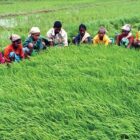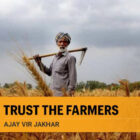Farmers are easily distracted from livelihood issues while the bureaucracy goes for half-baked solutions, driving India into a precarious future.
After half a century, India is under a major locust attack from breeding grounds in Balochistan in Pakistan. Other international tidings cause concern to the Indian farmer too. In 2014, crude prices had hit rock bottom and the government received a bonanza of a few lakh crore. Circumstances have changed today: India’s finances are in a perilous state and the country faces the spectre of a drought.
Meanwhile, the escalation of the US-China trade dispute is pushing the world towards a prolonged economic stagnation. President Donald Trump is also engineering a conflict in the strait of Hormuz to jack up crude prices. Not only is India not prepared to take advantage of the conflict, it is not even bracing up for the inevitable collateral damage to the economy.
In the aftermath of the imposition of duties on US agriculture produce by China, there are fears that the US government will pressure India to import US agriculture commodities like livestock feed, chicken and milk products and that the country will succumb to such pressure. On the eastern front, the commerce ministry is all prepared to sign the Regional Comprehensive Economic Partnership (RCEP), which will commit the country to becoming a gateway for Asian agriculture imports. India is being sucked into a similar treaty with the EU as well.
It may have been possible to survive the academicians who predict tomorrow based on yesterday or the economists who torture unsubstantiated data to produce counterfactuals. With all these combining with a system that fails to value climate change-related externalities, while persisting with the GDP-led policy modelling, surely the end will be nigh.
The government’s inflation-targeting priorities obviate the passing all of the escalating costs (diesel, LPG, food) to the consumers though the axe must fall somewhere. The complexities in MSP procurement and fertiliser prices will compound the morass of stagnating food prices. PM Kisan is a wonderful initiative of the government but the apprehension is that it may be funded by withdrawing resources from existing agriculture initiatives and programmes. Farmers have repeatedly shown that they are easily distracted from livelihood issues and must now be prepared for a precarious future.
One takes solace in the belief that the Bharatiya Kisan Sangh and Swadeshi Jagran Manch, (affiliates of the RSS) can pressure the government into some sort of import ring-fencing. Unlike other organisations, the RSS-affiliates are not under the tyranny of experts and are committed to improving livelihoods. They can no longer hide in the shadows and escape scrutiny though and will be blamed for any failure to stop policies that are antagonistic to farmers. Like the Congress Party, the establishment will soon realise to its own peril that rhetoric can only take one so far when there is no change on the ground and that the future arrives in unexpected ways.
Having noticed the big chasm between his vision and delivery, the PM has dropped nearly two-thirds of the members of his last council of ministers, including the minister for agriculture and farmer welfare. He would be well advised to use the brute parliamentary majority not for more disruptions but to ensure delivery. Governments, notorious for rolling out policies that cannot be implemented, generate truckloads of paperwork but are loath to documenting failure. Till the system learns to record failure and establish accountability, framing new policies would be like playing a game of dice.
For example, the policy on food parks has failed and private investments in the agriculture value chain remain elusive. The bureaucracy, having only dealt in food shortages, is clueless about how to respond to food surpluses and fluctuations while farmers have been quick to respond to market signals. This has created new problems, which lead to an unprecedented number of farmer agitations and suicides. Industry associations and newspaper editorials have been offering flawed market-oriented farm solutions. These only muddy the waters. Only the Prime Minister has the capacity to continually reinvent himself and take on the fringe elements in society.
Apart from other things, improving farmer livelihoods makes it imperative to quickly resolve issues of the animal husbandry sector. Incidentally, 80 per cent of the stray cattle on the roads today are Holstein, Jersey and basically crossbreeds. A clear distinction can be made between these foreign breeds and the pure desi (gau mata) breeds. It is time to advocate and fix problems within the political and ideological space available to the BJP. This is how a New India can be visualised.




